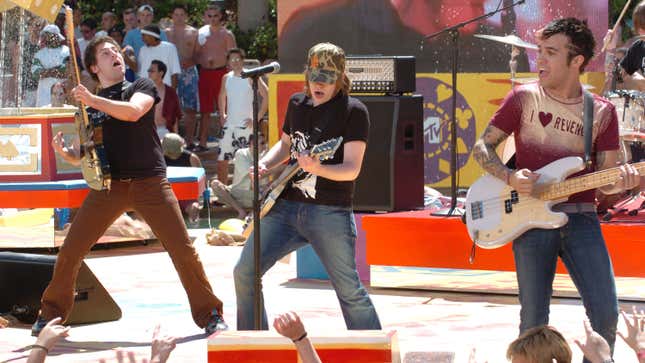The Miserable Business of Emo Masculinity
Entertainment
Image: Corey Perrine
“Tonight we’re playing this song for the last time for a really long time.” Paramore’s Hayley Williams sits on the stage floor of the storied Nashville Municipal Auditorium, floor lights on to disrupt the show and garner attention. “This is a choice that we’ve made because we feel that we should. We feel like it’s time to move away from it for a little.” The audience erupts in applause, excited that the band whose career exploded after the release of their biggest hit, 2007’s “Misery Business,” has announced they’ll never perform it live again—the rare example of a group excited to hear the new stuff, not the old. The date is September 7, 2018. Two years later, and Paramore has kept their word—they never attempted the song again.
A few months before Williams’s triumphant rejection of “Misery Business,” now read as infamously slut-shamey and chauvinistic for its lyric, “Once a whore, you’re nothing more,” I flew to Seattle to present a paper titled “Misery Business: Modern Pop-Punk & Emo’s Masculinity Problem” at Pop Conference, an annual music journalism and academic convention. That year, presentations centered around a broad theme of gender and music. As a woman and critic whose adolescence lined up perfectly with the aughts, with MySpace music, with pop-punk and emo boy bands on MTV’s TRL instead of the JTs and JCs that dominated the space years prior, the topic was irresistible. I could finally unpack what made the third-wave emo and pop-punk music I grew up on read as fundamentally misogynistic, while acknowledging what I found to be the failures of writing about emo: that toxic masculinity was foundational to the music’s framework and predicated on sexism, and that female fandom was an afterthought, to its listeners’ detriment and often, danger.
In fact, as journalist Megan Seling observed on the now-defunct Wondering Sound site in 2014, 53 percent of attendees at the annual Vans’ Warped Tour were female, while women made up only 6 percent of its performers (that’s ANY woman, in any role, in any group, in the year’s lineup of over 120 bands). As the premiere live music event for pop-punk and emo, the numbers were dismal. Simply put: men were on stage and women were left off it, as they continue to be—a visually striking and unsettling look into where the power lies, especially when the support of young women is the reason the scene still thrives.
Digging deeper, I found gender essentialist and sexist lyrics, unbalanced power structures that fostered abuse, a lack of musical virtuosity that celebrated cis male biology, and social processes that inform expressions of masculinity in emo performance. Basically, their whole musical world is fucked, dangerously posturing sensitive dudes in asymmetrical haircuts as an alternative to traditional forms of machismo instead of recognizing emo for what it was: the same shit by a different name. Now, two years removed, I’ve decided to revisit my presentation: to finally get at the heart of the miserable business of emo masculinity, a toxicity that continues to find new audiences and abuses.
In “The Cruel Truth About Rock and Roll,” for NPR, critic Ann Powers writes that “one of [rock] music’s fundamental functions has been to frame and express sexual feelings for and from the very young, and its culture has included real kids, the kind who feel free but remain very vulnerable, relating to older men whose glamour and influence encourages trust, not caution. The worst, weakest and most self-deluded of these men have stepped over moral lines, over and over again.” Third-wave emo and pop-punk is not exempt. In fact, that abuse of power—preying on young women in the audience whose connection to this music is sacred and obviously imperfect, a sensible form of fandom for a genre whose name is derived from the vague and intimate “emotional”—has become an overwhelming conversation when discussing the music, a symbol of how detrimental it can be when “sad, nice guy who can’t get the girl” music becomes literal.-

-

-

-

-

-

-

-

-

-

-

-

-

-

-

-

-

-

-

-

-

-

-

-

-

-

-

-

-

-

-

-

-

-

-

-

-

-

-

-









































